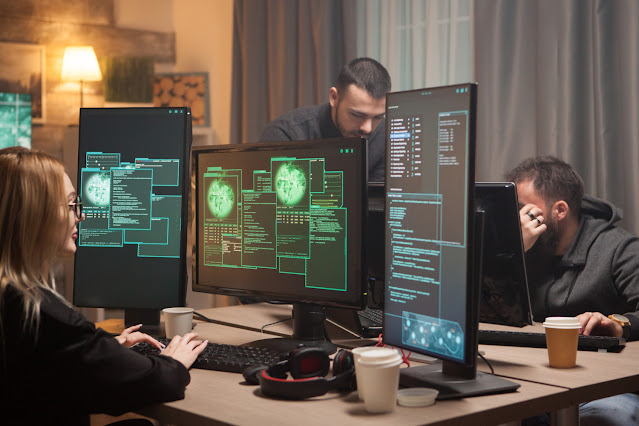In today's hyper-connected world, the reliance on digital technologies has become pervasive across all industries. However, with the increasing digitization, the risks of cyber threats have also surged. From data breaches to ransomware attacks, malicious actors constantly seek opportunities to exploit vulnerabilities in digital systems. Therefore, the demand for skilled cybersecurity professionals has skyrocketed. Among these professionals, cyber technicians play a vital role as the frontline defenders of our digital frontiers.
Understanding Cyber Technicians and Their Importance
Cyber technicians are specialized professionals who possess the technical expertise to safeguard digital assets, identify vulnerabilities, and respond to cyber incidents effectively. They are the unsung heroes who work behind the scenes to ensure the integrity, confidentiality, and availability of data and systems.
To become proficient cyber technicians, individuals can pursue the Certified Cybersecurity Technician (C|CT) certification. This industry-recognized certification equips aspirants with a comprehensive skill set, preparing them to tackle the diverse challenges presented by the evolving cybersecurity landscape.
Types of Cyber Security Roles Fulfilled by Cyber Technicians
Incident Response Specialists: Cyber technicians are trained to handle and contain cybersecurity incidents, responding swiftly to potential threats and minimizing the damage caused. They investigate breaches, analyze the scope of the attack, and implement measures to prevent similar incidents in the future. Incident response specialists are crucial for identifying and neutralizing threats before they can cause severe harm.
Network Security Analysts: Network security is a critical aspect of cybersecurity, and cyber technicians serve as network security analysts to protect organizations' digital infrastructure. They monitor network traffic, analyze patterns, and detect any suspicious activities that may indicate a potential breach or unauthorized access.
Vulnerability Assessors: Cyber technicians conduct thorough vulnerability assessments to identify weak points in an organization's digital systems. By proactively seeking and addressing vulnerabilities, they prevent potential breaches and safeguard sensitive information from falling into the wrong hands.
Malware Analysts: Malware remains one of the most significant cyber threats globally. Cyber technicians with expertise in malware analysis play a vital role in dissecting and understanding the behavior of malicious software. This knowledge lets them develop effective strategies for mitigating malware attacks and devising appropriate countermeasures.
Security Consultants: Cyber technicians often serve as security consultants, providing expert advice and guidance to organizations on enhancing their cybersecurity posture. They assess an organization's existing security measures, identify gaps, and recommend appropriate solutions to bolster defenses.
Security Operations Center (SOC) Analysts: Working in a Security Operations Center, cyber technicians are responsible for real-time monitoring of an organization's network. They analyze incoming data, respond to alerts, and coordinate with incident response teams to neutralize potential threats.
The Cyber Technician's Toolkit
To excel in their roles, cyber technicians rely on a variety of cutting-edge tools and technologies, such as:
Intrusion Detection Systems (IDS): IDS monitors network traffic for suspicious activities and generates alerts when potential threats are detected.
Security Information and Event Management software: Also known as SIEM, it aggregates and analyzes log data from various systems, helping technicians detect and respond to security incidents efficiently.
Penetration Testing Tools: Cyber technicians use penetration testing tools to simulate cyber-attacks and identify weaknesses in an organization's infrastructure.
Anti-Malware Software: To protect against malware threats, technicians deploy advanced anti-malware solutions which successfully detect and remove malicious software.
Wrapping It Up
In the digital age, cyber technicians have emerged as indispensable defenders of our digital frontiers. Armed with specialized knowledge and C|CT certification, these skilled professionals play multifaceted roles, from incident response specialists to network security analysts. Their dedication to safeguarding digital assets and mitigating cyber risks makes them invaluable assets for organizations across all industries.
FAQs
Q: What is the role of cyber technicians in the field of cybersecurity?
A: Cyber technicians play a crucial role as defenders of digital frontiers. They are specialized professionals equipped with technical expertise to safeguard digital assets, respond to cyber incidents, and identify vulnerabilities in digital systems. Their responsibilities encompass incident response, network security analysis, vulnerability assessment, malware analysis, and security consultation, making them indispensable for protecting organizations from cyber threats.
Q: Who is a CCT, and how does a C|CT certificate benefit aspiring cyber technicians?
A: A Certified Cyber Technician (CCT) is a professional who has earned the Certified Cybersecurity Technician (C|CT) certification, reflecting advanced knowledge and skills in cybersecurity. This industry-recognized credential prepares individuals to excel in the cybersecurity field, offering a multi-domain skills set, hands-on experience through 85 labs, capture the flag exercises, and a performance-based exam. By pursuing this certification, aspiring cyber technicians enhance their employability, demonstrating their expertise to potential employers and enabling them to contribute effectively as frontline defenders against cyber threats. The C|CT certification not only enriches their knowledge about different types of cybersecurity roles but also provides tangible experience and rigor that sets them apart in the highly competitive field of cybersecurity.
Q: What are the various types of cyber security roles fulfilled by cyber technicians?
A: Cyber technicians fulfill several key cyber security roles. These include Incident Response Specialists, Network Security Analysts, Vulnerability Assessors, Malware Analysts and Security Consultants.
Q: What tools and technologies do cyber technicians utilize in their day-to-day operations?
A: Cyber technicians rely on a variety of cutting-edge tools and technologies to carry out their tasks effectively. Some essential tools include Intrusion Detection Systems (IDS), Security Information and Event Management (SIEM) software, Penetration Testing Tools, and Anti-Malware Software.
Q: How does the demand for cyber technicians and the C|CT certification look in the future?
A: As the reliance on digital technologies continues to grow, the demand for skilled cyber technicians is expected to rise. Organizations across all industries recognize the need for dedicated professionals to safeguard their digital assets. Pursuing the C|CT certification can provide aspiring cyber technicians with a competitive advantage, ensuring they are well-prepared to take on the challenges of the ever-evolving cybersecurity landscape.


Comments
Post a Comment